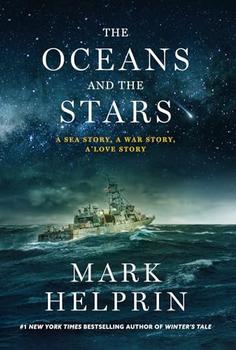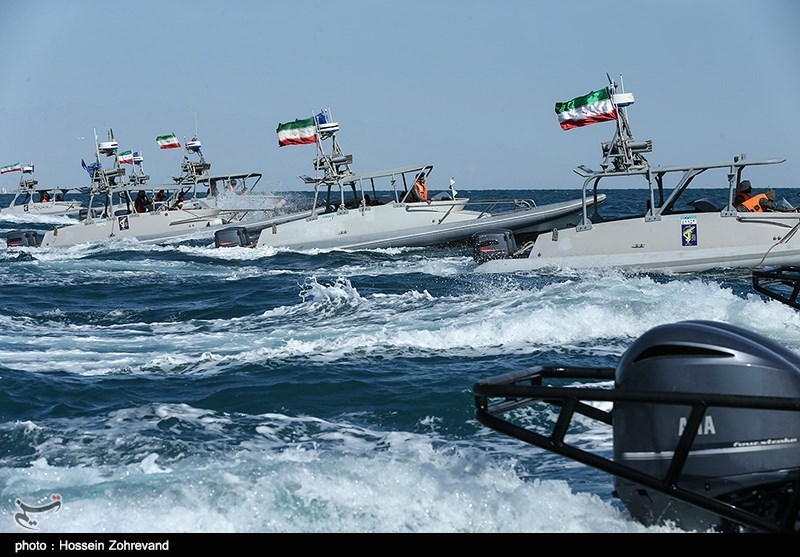Summary | Excerpt | Reviews | Beyond the Book | Read-Alikes | Genres & Themes | Author Bio

A Sea Story, A War Story, A Love Story (A Novel)
by Mark HelprinThis article relates to The Oceans and the Stars
 The plot of Mark Helprin's novel The Oceans and the Stars imagines the United States at war with Iran. At one point the heroes of the book end up in the Indian Ocean searching for an Iranian vessel, ultimately battling a force the US captain refers to as the NEDSA, the naval arm of the Iranian Revolutionary Guard Corp (Sepah-e Pasdaran-e Enqelab-e Eslami, aka the IRGC, also referred to as the Pasdaran or the Sepah).
The plot of Mark Helprin's novel The Oceans and the Stars imagines the United States at war with Iran. At one point the heroes of the book end up in the Indian Ocean searching for an Iranian vessel, ultimately battling a force the US captain refers to as the NEDSA, the naval arm of the Iranian Revolutionary Guard Corp (Sepah-e Pasdaran-e Enqelab-e Eslami, aka the IRGC, also referred to as the Pasdaran or the Sepah).
Iran has two independent military organizations. The first, the Islamic Republic of Iran Army, Artesh-e Jomhouri-ye Eslami-ye Iran or simply Artesh, pre-dates the 1979 Iranian Revolution and is responsible for defending the country's borders against external threats and maintaining internal order. It's considered a conventional military force, and has traditional army, navy, air force and air defense branches. Its role is similar to what Americans think of as a classic armed services organization.
The other is the IRGC, formed after the Revolution during a time when the traditional military's allegiance was suspect. The Iranian Constitution states that the IRGC must be maintained to "guard the Revolution and its achievements," and as a result this military body has grown into a more aggressive and more political organization with a wider reach. In addition to having its own army, navy and air force, it has an intelligence wing. The United States designated the IRGC a foreign terrorist organization (FTO) in 2019 because of "its acts of global terror, violations of the laws of armed conflict, assassination attempts, and support for regional terrorist groups," according to the US Foreign Relations Committee.
The IRGC Navy (Nirooy-e Daryaei-e Sepah or NEDSA) was originally established in 1981. Its role was expanded substantially in 1999 when it was tasked with protecting the Strait of Hormuz – a 745-mile stretch of waterway that borders Iraq, Kuwait, Saudi Arabia, Qatar, Bahrain, Oman and the United Arab Emirates – through which up to a third of the world's seaborne oil passes. Patrolling this stretch of water has been NEDSA's primary mission since. The force participates in other operations such as guarding commercial vessels and fighting pirates – and harassing ships from other nations, particularly those from the US, Israel and other Western countries. Unlike the Artesh Navy, which uses conventional strategies and maneuvers, the IRGC relies more on asymmetric warfare – in short, guerilla tactics.
Under the command of Commodore Alireza Tangsiri, NEDSA employs approximately 20,000 people (out of a total of 150,000-190,000 individuals in the IRGC). It's not an overwhelming force by any means, and most of the vessels it operates are small (but fast). It's estimated that NEDSA controls around 100 patrol boats and corvettes, and between 3,000 and 5,000 speedboats it deploys in groups to overtake and overwhelm its opponents.
Confrontations between US ships and NEDSA occur periodically; there were dozens of incidents during the Obama Administration, and at least a dozen more in the four years Trump was in office. Those encounters are usually simple harassment, with fast attack boats approaching US Navy ships too closely for comfort, sometimes resulting in the US vessel firing warning shots to encourage the NEDSA boats to depart. It's thought that most of these encounters aren't directed by the IRGC's command structure but initiated by over-eager local commanders in the heat of the moment.
NEDSA has sought to capture ships in the region, and they've succeeded from time to time, most famously in 2016 when two US Navy riverine command boats (a type of fast assault craft) were seized and their crews briefly imprisoned and released after the intervention of John Kerry, the Secretary of State at the time. While NEDSA personnel have fired on US ships, the US hasn't fired directly at one of their vessels since 1988, although it has shot down NEDSA drones and missiles many times. Nevertheless, the situation remains volatile, and the US Naval Command has expressed concern that a miscalculation could result in a rapid escalation of hostilities.
War brides on the deck of the SS Argentina, courtesy of Tasnim News Agency CC BY 4.0
Filed under Places, Cultures & Identities
![]() This "beyond the book article" relates to The Oceans and the Stars. It originally ran in January 2024 and has been updated for the
October 2024 paperback edition.
Go to magazine.
This "beyond the book article" relates to The Oceans and the Stars. It originally ran in January 2024 and has been updated for the
October 2024 paperback edition.
Go to magazine.
The whole problem with the world is that fools and fanatics are always so certain of themselves, and wiser people ...
Click Here to find out who said this, as well as discovering other famous literary quotes!
Your guide toexceptional books
BookBrowse seeks out and recommends the best in contemporary fiction and nonfiction—books that not only engage and entertain but also deepen our understanding of ourselves and the world around us.